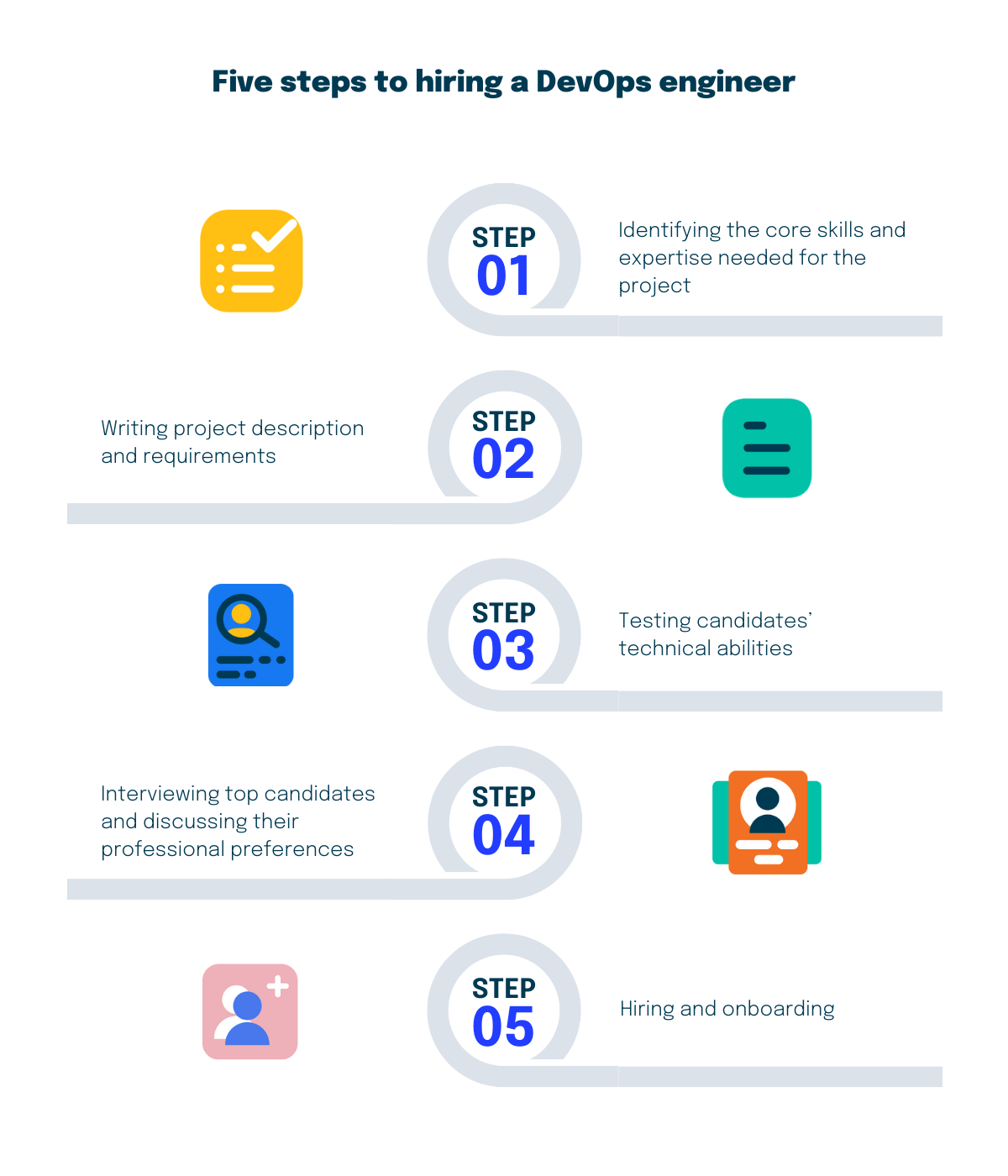The DevOps engineer is a highly specialized job that is considered difficult to find on the market. According to research conducted by CodinGame, this is among the top three positions recruiters struggle to fill.
Fortunately, DevOps’s set of practices is in the top five skills developers want to learn in 2024, so future demand should be easier to meet. Furthermore, globalization and the rise of digital technology have opened up a global market for remote professionals with the same education and experience level as local talent.
The global DevOps market size was valued at $8.7 Billion in 2022. According to IMARC Group Research, it is projected to reach $32.7 Billion by 2028, registering a compound annual growth rate (CAGR) of 24.5% between 2023 and 2028. This industry’s market growth is driven by the rising need for continuous and rapid application delivery and an increased focus on reducing company costs.
Table of Contents
Why Hire a DevOps Engineer?
A great DevOps engineer can change a company and should be hired full-time early on—when the product is already shipped or when there are at least three developers on the team.
Employers are hiring DevOps specialists to streamline the process of software application development. In a world of high-paced applications and platform improvements, companies want to stay competitive and cyber-secure. Therefore, projects will move along quicker if the DevOps function is in explicit possession.
DevOps engineers are IT generalists with a wide-ranging knowledge of both development processes and operations, including coding, cloud, Kubernetes monitoring, configuration management, Infrastructure-as-Code, and system administration. Their main responsibility is to get features and bug fixes from the development team to the servers continuously and automatically.
These professionals prepare the infrastructure to run the application and should have at least a basic understanding of how to configure firewalls and secure the app. They talk to project managers, developers, testers, and the IT operations team to figure out how to automate the project to make it faster and more reliable.
DevOps Engineer Tasks and Responsibilities
A DevOps engineer is responsible for building, managing, and automating infrastructure and tools so that software can be developed and released. A project description for a DevOps Engineer may contain the following tasks and responsibilities:
- Designing, building, testing, and deploying new development tools and infrastructure.
- Improving development and release processes by identifying opportunities for automation.
- Maintaining the company’s infrastructure security protocols.
- Working with software engineering teams to ensure that development follows established guidelines.
- Participating in project management decisions.
- Developing procedures for troubleshooting and system maintenance.
What Does DevOps Engineer Do: Skills Overview
The technical skills required of a DevOps engineer depend on the team structure, technologies, and toolsets in use. It is crucial for them to understand the components of a delivery pipeline and to know the strengths and weaknesses of available tools and services.
However, regardless of the project, these specialists should have strong communication and cooperation skills. DevOps is a way (and often the only way) to bring the development and operations teams together by helping them to communicate better.
DevOps Technical Skills
- Strong computer science fundamentals: networking, databases, and distributed systems
- Knowledge in building, maintaining, and improving CI/CD pipelines to deploy applications in a timely and efficient manner
- Practical experience with container orchestration systems such as Kubernetes
- Fluency in at least one mainstream language: Python, Ruby on Rails, or Go
- Experience with Infrastructure As Code (e.g., Terraform, Ansible, Chef)
- Experience with logging, monitoring, and alerting systems and tools
- Thorough understanding of information security practices
DevOps Interpersonal Communication Skills
- As a link between development and operations, DevOps needs to embrace different perspectives. Seeing things from the other person’s point of view can help reframe the conversation so that it doesn’t turn into an argument but becomes a productive discussion that moves processes forward.
- Ability to translate technical details in simple terms to software engineers and non-technical employees alike.
- Ability to manage technical discussions with other engineers to find the best solution to complex infrastructure, development, or security problems.
- Experience with leading and mentoring other development team members for DevOps best practices.
How to Prepare DevOps Interview Questions
Make sure to have a standardized interviewing process to evaluate candidates better. Prepare a list of the most important questions to cover and draft possible answers. You can start with general questions about desired salary, recent professional accomplishments, or certifications and then discuss the engineer’s understanding of DevOps culture and methodology. Here are examples:
- What are you looking for in your next position?
- What are your best professional qualities?
- What was your recent professional achievement using DevOps practices? Are there any projects that you just knocked out of the park?
- How long would it take you to learn the new tool or build a skill set?
- What are the DevOps tools that you’re just not interested in or struggle to use?
- Give an example where you faced very poor architecture. How did you approach that problem?
- Name the differences between Agile and DevOps
- What are the factors of performing continuous integration successfully?
- What is the concept behind sudo in the Linux operating system?
- Can you explain the architecture of Jenkins?
- What are the key differences between Continuous Delivery and Continuous Deployment?
Employers can find more interview questions (with example answers) to gain insight into DevOps engineer knowledge and experience and evaluate problem-solving skills.
During the hiring process, companies should also discover how a candidate’s values and behaviors align with their organization’s values and culture. DevOps engineers should possess interpersonal skills since they work across company silos to create a more collaborative environment.
YouTeam collected 150 questions for remote-engineer interviews to help assess soft skills. Employers can also measure a candidate’s technical skills, personality, and fit using pre-employment test platforms such as TestGorilla.
Hiring a DevOps Engineer: Four Hiring Models
Employers can incorporate different hiring models: in-house hiring, outsourcing, contracting, and freelance.
In-House Hiring
Tech companies hire full-time, in-house employees to build their core team and culture. In addition, in-house staff members tend to be more motivated—they explore a product in detail because they are committed to developing it and growing the company.
Companies can hire in-house engineers by hosting or attending hackathons and tech conferences. They can also request an in-house engineer from headhunting companies.
Finally, employers can look at their local market by utilizing your HR services—browsing LinkedIn profiles or posting a DevOps engineer job on Angel.co or Glassdoor.com is a good starting point.
Remember, though, job boards were invented during the Great Depression when millions of people were out of work, and there was a talent surplus. There is no talent surplus in today’s job market, so simply posting a job opening may not attract the most desired professionals.
Outsourcing
Tech companies use this hiring strategy when focusing on their core business aspects by assigning development to outside organizations managed by their CTO or product owner from the in-house team.
Outsourcing companies, like any employer, carry risks and are much more careful about selecting people, unlike freelance platforms. However, outsourcing limits communication between the company and external providers as you will not manage each member of the extended team directly.
Employers can browse software development companies on Clutch or GoodFirms and visit their websites to see if there are any DevOps specialists.
Staff Augmentation
Staff augmentation works in a similar way to outsourcing in terms of the hiring process. You can find engineers for your team through development agencies. The difference is that with this model, you focus more on talent rather than specific job roles. The engineers you select become your full-time team members, managed directly by you.
As we mentioned in the previous section, finding DevOps through outsourcing companies can take time because employers need to find a list of such companies, go to each agency’s website, and find out if they have DevOps professionals available.
With staff augmentation via YouTeam, the process is quicker and easier. Our marketplace has full-time employed DevOps engineers from multiple outsourcing agencies. In particular, YouTeam has a network of 50,000 vetted contractors from hundreds of development companies, so hiring managers don’t have to visit every agency’s site in search of a professional.
Employers can quickly hire several DevOps engineers using the talent pool of YouTeam contractors—it takes about 48 hours after contacting YouTeam to receive a verified list of candidates.
Browse DevOps Engineers Available for Hire
Freelance
Hiring freelancers is suitable for short-time projects, small tasks, and companies with limited budgets. In contrast to in-house engineers and contractors, freelancers are often responsible for several jobs, and the quality of their output could be subpar to that of a client’s specifications. Furthermore, because these developers are often juggling multiple projects, employers don’t have the same control over a freelancer as they do with a contractor or in-house employee.
Companies can browse profiles or let recruiters handpick DevOps engineers on UpWork.
How Much Does It Cost to Hire a DevOps Engineer
According to the 2022 Stack Overflow Developer Survey, DevOps specialists are the tenth highest-paid developer type, with a median annual salary of $160,000 in the United States and $80,000 globally.
We’ve also compiled information on the average salaries of DevOps engineers on Glassdoor. Please note that the platform took into account the earnings of engineers with varying degrees of expertise, meaning that actual salaries may differ from case to case.
These numbers represent the median incomes as reported by Glassdoor’s proprietary Total Pay Estimate model based on salaries collected from the platform users. Wages in India, the United States, Canada, Mexico, and the United Kingdom consist of a base salary and additional pay, which may include cash bonuses, commissions, tips, and profit sharing.
| Country | Salary per year, USD |
| United States | $135,000 |
| Canada | $93,000 |
| Mexico | $87,000 |
| Brazil | $52,000 |
| United Kingdom | $89,000 |
| Germany | $87,000 |
| Romania | $45,000 |
| Ukraine | $55,000 |
| China | $72,000 |
| India | $26,000 |
| Australia | $86,000 |
*According to Glassdoor
Given the shortage of DevOps engineers in the United States, companies hire full-time contractors from other countries willing to work offshore. Furthermore, software development companies from countries such as Ukraine or Brazil charge less than their US or Western European counterparts.
| Country | Argentina | Brazil | Uruguay | Ukraine |
| Average hourly rate, USD | $56 | $53 | $56 | $48 |
*According to YouTeam
Where to Find and Hire DevOps Engineers?
Depending on the hiring model, we suggest a list of groups, job boards, and communities for DevOps engineers. These links will guide employers on where to post jobs, find contractors, or visit communities to connect directly with the most active users.
Staff Augmentation
- Hire DevOps engineers at YouTeam
Outsourcing
Freelance
- Browse profiles or post a job on Upwork
- Search profiles by filtering DevOps skills on Hubstaff Talent
In-house Hiring: Job-boards
Communities and Groups
- DevOps Slack community
- DevOps groups on Meetup
- AWS and DevOps Learning Community on Facebook
- DevOps Stack Exchange
Why Choose YouTeam to Hire Remote DevOps Engineers?
YouTeam’s pool of professionals can help tech companies extend their DevOps teams quickly. Unlike hiring full-time remote talent, employers hiring contractors through YouTeam don’t need to make retirement contributions or pay for health insurance, bonuses, vacations, office rental, or workstations.
Here are some advantages of hiring DevOps professionals via YouTeam:
- Staff augmentation will allow employers to address skill gaps quickly with additional expertise. It takes 48 hours after contacting YouTeam to receive a verified list of candidates.
- YouTeam pre-interviews middle and senior engineers to ensure that they are the best fit to meet customers’ requirements.
- YouTeam automates contract signing and billing between customers and software development vendors. There are no commitments before this point.
- A dedicated Customer Success Manager helps facilitate cooperation with engineers, assists with team expansion requests, and answers any legal or financial questions.
Hiring a DevOps Engineer: FAQ
How do I hire a DevOps engineer?
Hiring a DevOps engineer usually involves the following steps:
- Identifying the core skills and expertise needed for the project
- Writing project description and requirements
- Testing candidates’ technical skills
- Interviewing top candidates
- Hiring and onboarding
When should I hire a DevOps engineer?
A DevOps engineer should be hired full-time early on—when the product is already shipped or when there are at least three developers on the team.Employers are hiring DevOps specialists to streamline the process of software development. In a world of high-paced applications and platform improvements, companies want to stay competitive and cyber-secure. Therefore, projects will move along quicker if the DevOps function is in explicit possession as early as possible.
How much does a freelance DevOps engineer cost per hour?
According to YouTeam, the average hourly rate for a remote DevOps engineer in Ukraine is $48, compared to $53 in Brazil and $56 in Argentina.
What does a DevOps engineer do?
What skills are companies looking for in DevOps engineers?
DevOps should be familiar with computer science fundamentals, such as networking, databases, and distributed systems. They should also have knowledge of building, maintaining, and improving CI/CD pipelines to deploy applications in a timely manner, as well as hands-on experience with container orchestration systems such as Kubernetes. It is crucial for them to understand the components of a delivery pipeline, and the strengths and weaknesses of available tools and services. In addition, these professionals should have strong communication and cooperation skills. DevOps is often the only way to bring the development and operations teams together by helping them to communicate better.








